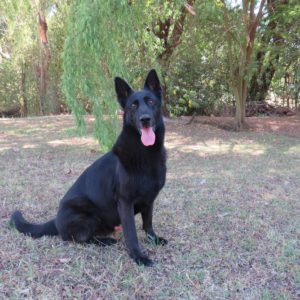
WORLD RANGER DAY – A CELEBRATION OF OUR EWT CONSERVATION CANINE RANGERS
Megan Murison. EWT Communications Officer, meganm@ewt.org.za
On the 31 July 2020, we celebrate World Ranger Day. This is a day to acknowledge the courageous rangers who risk their lives daily to protect our wildlife, and to commemorate the lives of those who have died fighting for this cause. This year we would like to celebrate the lives and work of our Conservation Canine rangers, particularly the two amazing dogs who passed away in June 2020, Fury and Annie.
Conservation Canine Fury worked with his handler, Shay Seebran, in the screening of vehicles for wildlife products and ammunition. Their two-year partnership included many happy memories and even a few occasions where Fury saved Shay’s life, such as when they encountered an elephant in the bush on a routine antipoaching patrol:
“Fury and I were patrolling towards an observation post approximately 8 km away, when we came across a very moody bull elephant. Despite everything I tried to defuse the situation and back away, the elephant made it clear that we had been in his comfort zone for too long, and that mock charging was not an option anymore. I unclipped Fury’s lead and chased him because I knew I was not going to outrun the elephant, nor did I want to shoot the animal. I guess Fury’s instinct kicked in and despite his size he charged at the elephant charging at me, putting himself between me and the elephant, miraculously stopping the elephant in his tracks and sending him fleeing in the opposite direction, leaving me speechless and in tears, thanking my K9 for saving my life”
-Shay Seebran
Travelling across South Africa as a team, they spent every second of the day together, leaving an everlasting footprint in the fight to save African wildlife. Fury, a legend in conservation and a well-known friend to many, has left his legacy to be carried on by many conservationists just like him. Losing him was a big loss to Shay and the EWT as a family.
“The legend may be gone, but certainly not forgotten, and I appreciate your service, rest in power son.”
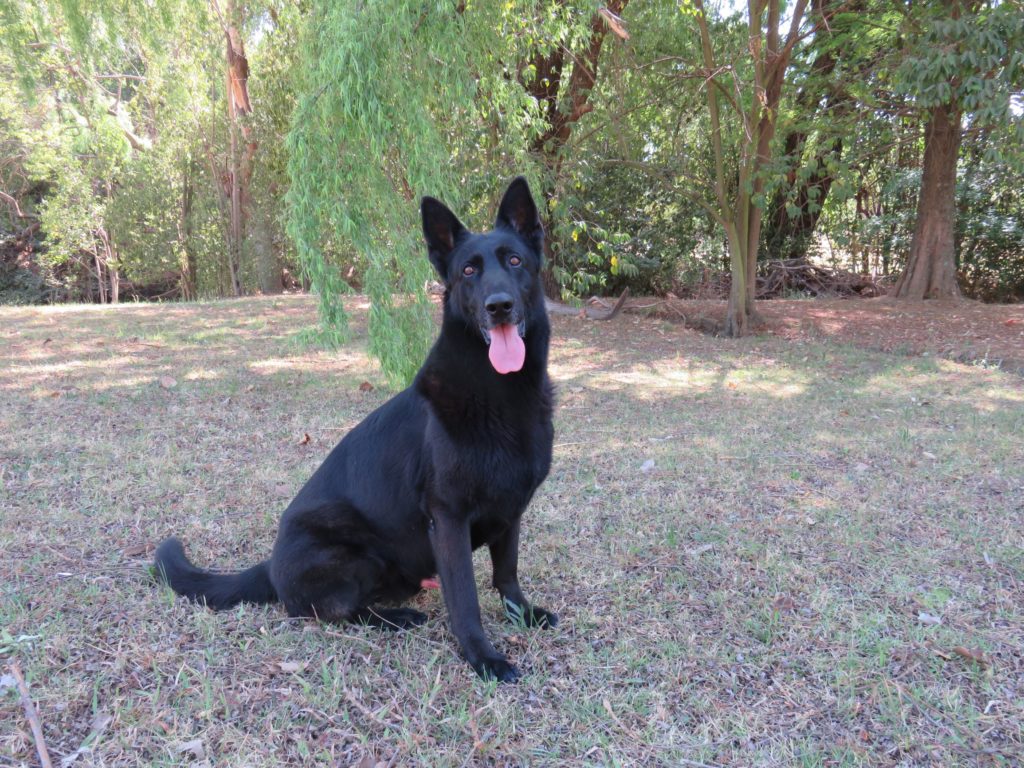
-Shay Seebran
Conservation Canine Annie was sponsored by the EWT and trained at the Southern African Wildlife College. This is where she met her handler, Colin Patrick. Annie was trained to track, and her job was to follow up on poacher spoor at both fence incursions and away from crime scenes. Her legacy is proof that she was a true hero. Annie and her handler Colin were one of the first K9 Conservation teams to develop the ability to track down suspects at night, which changed the game in the fight against rhino poaching, and the team became highly successful at tracking down and arresting suspects. She assisted with over 17 arrests, one of which was a 13 hour follow up, during which they tracked poachers for 43.5 km to successfully apprehend the suspects. An extremely loyal conservation canine since 2018, she never left Colin’s side and travelled with him wherever he went.
“Their bond was unbreakable and one in a million and all were amazed by their connection”.
-Becky Patrick
“It was a privilege and honour to be a part of Annie’s life, to call her my partner and friend. Thank you, Annie, for your dedication and loyalty. Your legacy is an inspiration to all conservationists.”
-Colin Patrick
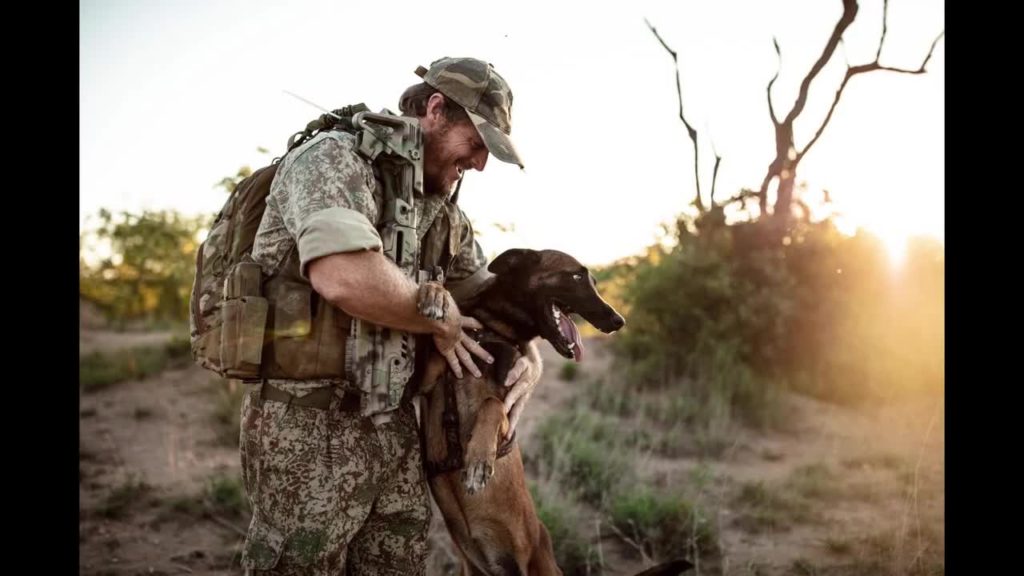
Fury’s work was funded by U.S Fish and Wildlife Service and Tourvest and supported by Royal Canin and Boehringer-Ingelheim. Annie’s work was supported by the EWT through sponsorship from the Relate Trust, MyPlanetRhino, Platinum Life, Royal Canin and Boehringer-Ingelheim, and a big thanks to Tomlin’s family for their ongoing support of the EWT Conservation Canines.
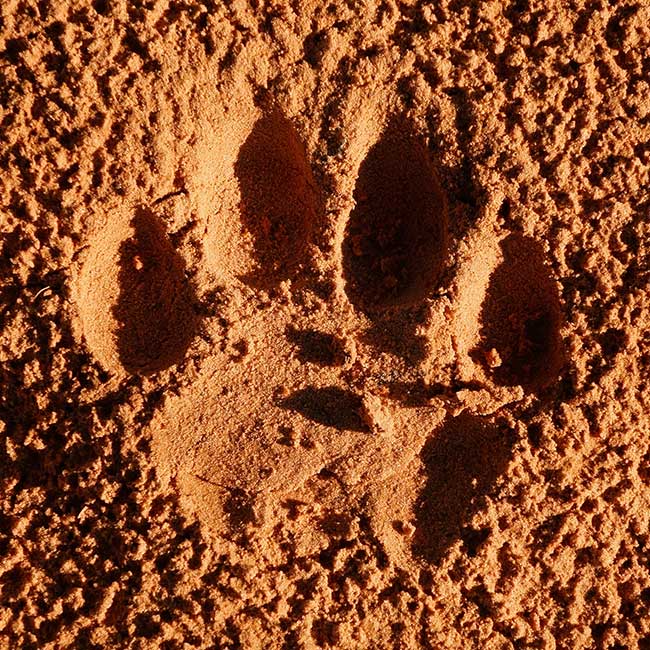
LOCKDOWN DOESN’T MEAN SLOW DOWN FOR THESE CONSERVATION CANINES
Shadi Henrico, Conservation Canine Project Coordinator, EWT Wildlife in Trade Programme
shadih@ewt.org.za
The lockdown has brought new challenges, but our Conservation Canines continue to work (and play) as hard as ever.
Tracking under the moon light
With the implementation of the nationwide lockdown, our tracking dogs’ efforts in reserves were increased due to the risk of increased criminal activities. In the Lowveld, EWT Conservation Canine Annie and her handler were part of an operation involving several crime prevention units. They tracked down and assisted with the capture of two suspected poachers. Annie and her handler also supported an operation in which eight suspects were caught in the possession of dried- and fresh bushmeat, knives, axes, and snares. She happily works with her handler in any conditions and adapts very quickly no matter day or night, sun, or rain.
Taking flight
Time is of the essence when tracking suspected poachers. EWT Conservation Canine Puk, based in the Lowveld, has increased his training on flying in helicopters with his handler. This is a quick way to get to work and start tracking, and reduces time available for suspects to escape. Puk is the second EWT Conservation Canine to be trained to ride in a helicopter. Once the rangers in the field discover any incursions, attempted poaching, or actual poaching in progress, they alert the canine team, which can get in the air within a very short time. Once they get closer, they can lower the handler and dog to the ground and this team can immediately track down the culprits!
Vehicle detection
It is of the utmost importance to search all vehicles entering and exiting reserves for wildlife contraband, ammunition and arms. These searches are conducted daily. In April alone, two of our EWT Conservation Canines, Spike and Fly, searched 221 vehicles at reserve entrances. Large areas and compounds are also covered by these teams. With the implementation of lockdown, certain unforeseen challenges risen. For example, Fly fell ill during this time. Thanks to excellent veterinarians, he was treated, and work resumed. Even in lockdown and with the heat of the Lowveld, we always prioritise our canines’ health and happiness!
Training during lockdown
We have two handlers, Shay Seebran and Innocent Buthelezi, staying at our Gauteng Conservation Campus in Midrand to care for our dogs and continue their training. When the lockdown was announced, we developed a plan of action that would allow for daily training to continue to take place, despite our senior handlers not being able to train in person. Our lockdown canine training involves using live video calls and regular check-ins. From her home in Pretoria, our Conservation Canine Coordinator, Shadi, video calls our handlers every day to see how both the dogs and the humans are doing in this challenging time and observe training in real time, providing instruction and feedback. Each day, these EWT Conservation Canines do open area searches, vehicle searches, building searches, and training on tyre rims. This keeps them up to date and makes sure that they do not lose their focus on the job. Just like us – they must keep their skills up to speed! Training records are completed as normal and our dogs are at their happiest when they can work.
Normal husbandry, like kennel cleaning and feeding, continues as normal. Welfare remains our top priority – we love our happy, healthy dogs – and they love long walks and getting groomed. We are very privileged to have our own dogs on our own property. Here they can still go for long walks, run free and swim. They probably have it better than most of us in lockdown!
Thanks to our funding partners, US Fish and Wildlife, Tourvest, Greeff Properties, the Tomlin family, Royal Canin, Boehringer-Ingelheim, MyPlanet Rhino Fund, Relate Trust, Platinum Life and GivenGain.

REMEMBERING CONOR TOMLIN
“You cannot leave Africa, Africa said. It is always with you, there inside your head.” – Bridget Dore, poet.
Conor Tomlin was born in Johannesburg on 28 March 1999. His life involved extensive travel and experiences of living around the world with his parents due to his mum’s career. As a boy, he lived in Egypt, Ireland, England, in the USA in both California and Nashville, and in Australia, before returning to South Africa to live in Cape Town when he was 13. There, he attended the British International School, and upon graduation, he left South Africa again to attend college in the USA, where he studied Computer Science.
Conor was a real all-rounder in life. He was an enthusiastic and strong rugby player, which he was well suited to with his 6ft3 sturdy frame. He played the tuba in the school band in Australia, and performed a leading role in two school plays; Aladdin and High School Musical. He was a capable student, achieving A grades in his A Levels in Maths, Computer Science, and Spanish.
Conor continued his love of travel by participating in Rustic Pathways projects as a volunteer in Thailand, Laos, and Peru during school holidays.
But his heart was increasingly in Africa, and he fell in love with the bush initially through trips with his family, and later through his work as a volunteer on wildlife conservation projects in the Kruger National Park and in Zimbabwe. Conor missed South Africa very much during the two years he was at college in the USA and returned every holiday, which always involved a trip to the bush. He was a keen wildlife photographer, and leaves behind him literally thousands of photos of wildlife, birds, and of the beautiful African habitats he visited. Conor was also a very capable horse rider and a special memory his family have of him was his happiness from the experience of game viewing by horseback in the Kalahari, during their last family bush trip.
Conor was known for his kindness and generous spirit; he made friends all over the world, always with an open heart, and many have written of how he helped them. He was a kind and affectionate big brother to his sister, Aoife, and a loving son to his parents, Stephen and Fiona. Conor was a special young man who planned to return to Africa after college. He talked of using his Computer Science skills to contribute to the fight against poaching. Sadly, this couldn’t be fulfilled due to Conor’s tragic and untimely death. He is greatly missed by all who knew him, who cherish their memories of him and the gifts and love he brought to their lives.
Conor’s family has decided to donate funds to the EWT Wildlife in Trade Programme Conservation Canine Project for the next five years, in honour of Conor and to memorialise his life and love for Africa’s bush.
You can leave a legacy too
The EWT relies on bequests both large and small to ensure that we continue fulfilling our vision of a healthy planet and an equitable world that values and sustains the diversity of all life. None of us can avoid the need to have an up-to-date will, ensuring that our last wishes are carried out and our legacy is continued in the way that we would choose. Including a bequest to an organisation like the EWT that you have supported in your lifetime, or that you would have liked to support, is a way to bring meaning and purpose to a life well-lived, and know that you have left the legacy of a better planet for future generations. We assure you that your legacy will make a lasting impact to the benefit of all who inhabit our beautiful country.
Your bequest will help us to…
- Empower communities to live and work in harmony with nature
- Increase safe space for Cheetahs and Wild Dogs in South Africa and beyond
- Conserve grasslands and wetlands to secure our critical water sources
- Ensure our iconic raptors remain in the skies
- Raise awareness and create connections between young people and their natural environment through our schools programmes, developing the guardians of the future
… and so much more!
We are proud to be working with Capital Legacy to make leaving a legacy even easier. With a wealth of knowledge and expertise, Capital Legacy provides you with client-centric and excellence-driven service when it comes to drafting your Will, taking care of the administration of Trusts and administering your Estate in the event of your death. Capital Legacy are also the innovators of the Legacy Protection Plan™, an insurance product that completely protects your beneficiaries from the legal fees and expenses that arise when you pass away. Capital Legacy is also committed to protecting forever, together, and for every Legacy Protection Plan™ referral they receive from the EWT, they’ll be making a donation to the organisation. Find out more at https://ewt.org/get-involved/get-involved-leave-a-legacy/ or contact TammyB@ewt.org.za

FIGHTING FOR OUR RHINOS
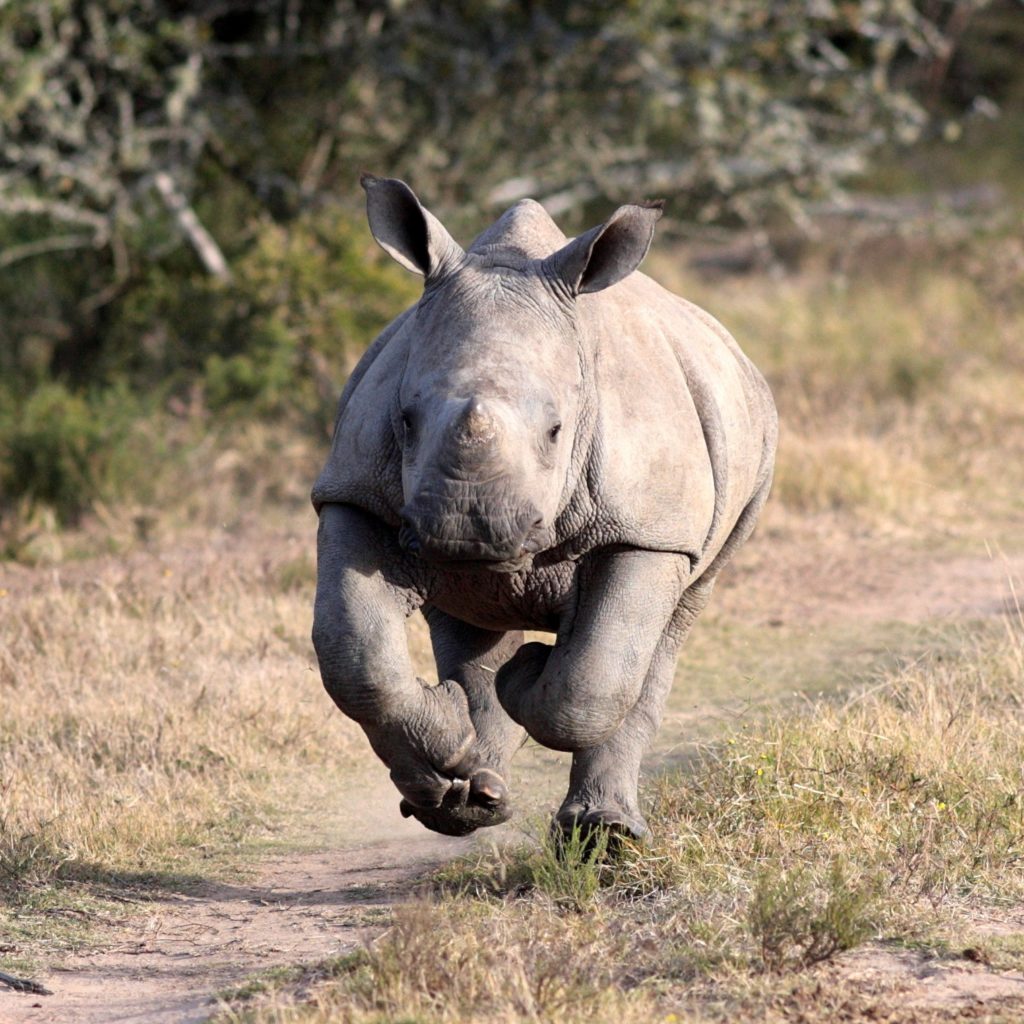
Ashleigh Dore, Manager, EWT Wildlife in Trade Programme
ashleighd@ewt.org.zaFew people are unaware of the rhino poaching crisis which persists in South Africa. 7,900 rhinos have been poached in South Africa since 2008 for their horns. These horns are then smuggled out of South Africa to demand countries, primarily in Asia. In an effort to combat the illegal trade and smuggling of rhino horn, the EWT will be partnering with the Department of Environment, Forestry and Fisheries to enhance detection capabilities at ports of entry and exit through the use of highly trained canines. These canines will screen cargo and luggage for wildlife products like rhino horn.
The EWT has been actively involved in addressing the scourge of rhino poaching since 2010, and this partnership is the latest of these efforts. Others include:
Patrol optimisation
Observations made by patrol teams are pivotal for monitoring poaching trends and identifying patterns. With proper analysis, these data provide enforcement decision makers with invaluable information for patrol deployments or reallocation of other resources. We have undertaken projects to enhance capacity to prevent wildlife crimes within private and state-owned protected areas through the collection of data (using CMore or other relevant platforms) and analysis of the same, thereby generating valuable information and facilitating more intelligence-driven investigations. Further, these projects facilitate the creation of predictive models that will enable law enforcement to take a proactive approach towards targeting illicit networks.
Prevention and detection
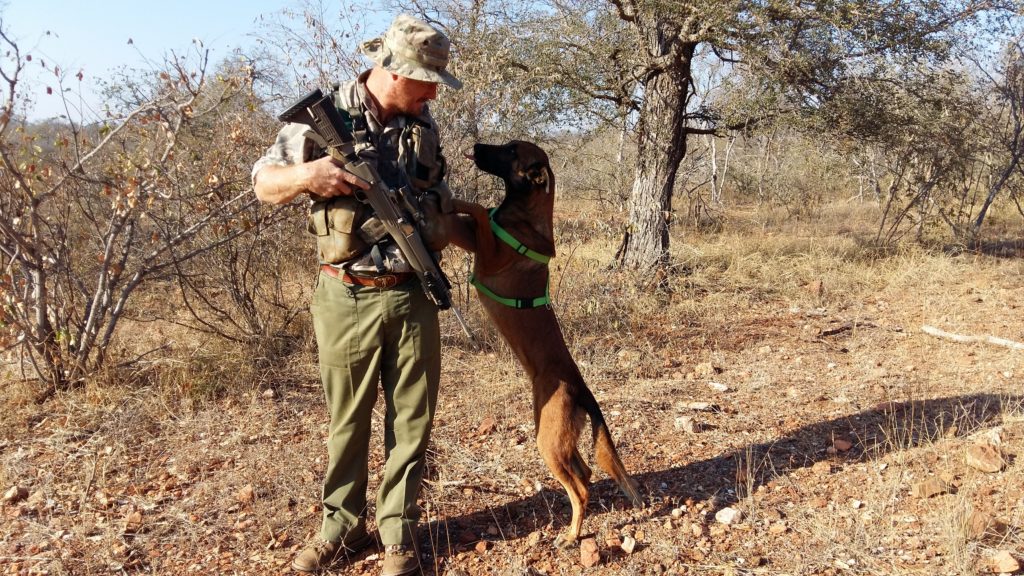
Our Conservation Canine Project continues to grow from strength to strength. Conservation Canines play a vital role in the protection of South Africa’s wildlife and offer critical support to anti-poaching efforts. The Conservation Canine Project provides three different types of service to combat wildlife crimes involving rhino including poaching and smuggling:
- Tracking Conservation Canines: these Conservation Canines are trained to follow humans through the bush. These dogs follow tracks when breaches in the reserve boundaries have been noticed or to track poachers from poaching scenes to apprehend them. Our trackers include EWT Conservation Canines Annie, Blacky Grizzly, Puk and Basil.
- Detection Conservation Canines: these Conservation Canines are trained to detect and indicate various wildlife contraband such as rhino horn and elephant ivory as well as ammunition. The dogs are used at reserve gates to search vehicles and people, to search luggage and crime scenes. Our detection canines include EWT Conservation Canines Condor, Fury, Hitsch, Heddie, Vito, Bullet, Spike and Fly.
- Conservation Patrol Dogs: The Conservation Patrol Dogs are used to support anti-poaching units such as the Black Mambas with visible policing and as a first alert system to dangerous game in the area. EWT Conservation Canine Alice is currently our only conservation patrol dog.
We have worked closely with law enforcement agencies over many years to build capacity to combat wildlife crimes, including the poaching of rhino and the smuggling of their horns. We also have undertaken dedicated awareness raising with prosecutors from the National Prosecuting Authority as to the seriousness of rhino related crimes.
We are also commencing with a new project, utilising restorative justice approaches. Restorative justice is a holistic approach to justice that aims to involve the parties to a dispute and others affected by the harm (such as the victim, the offender and the community) in collectively identifying harms, needs and obligations through accepting responsibilities, making restitution and taking measures to prevent a recurrence of the incident and promoting reconciliation. Restorative justice is a well-established approach to justice that can and will have very meaningful impacts on rhino related crimes in South Africa. It will promote enhanced community engagement, provide an opportunity to the victim to be properly heard and will contribute to a change in mind-set and reduce recidivism on the part of the offender. The Restorative Justice Pilot Project will facilitate the application of restorative justice processes to inter alia rhino related crimes in key sites in South Africa.
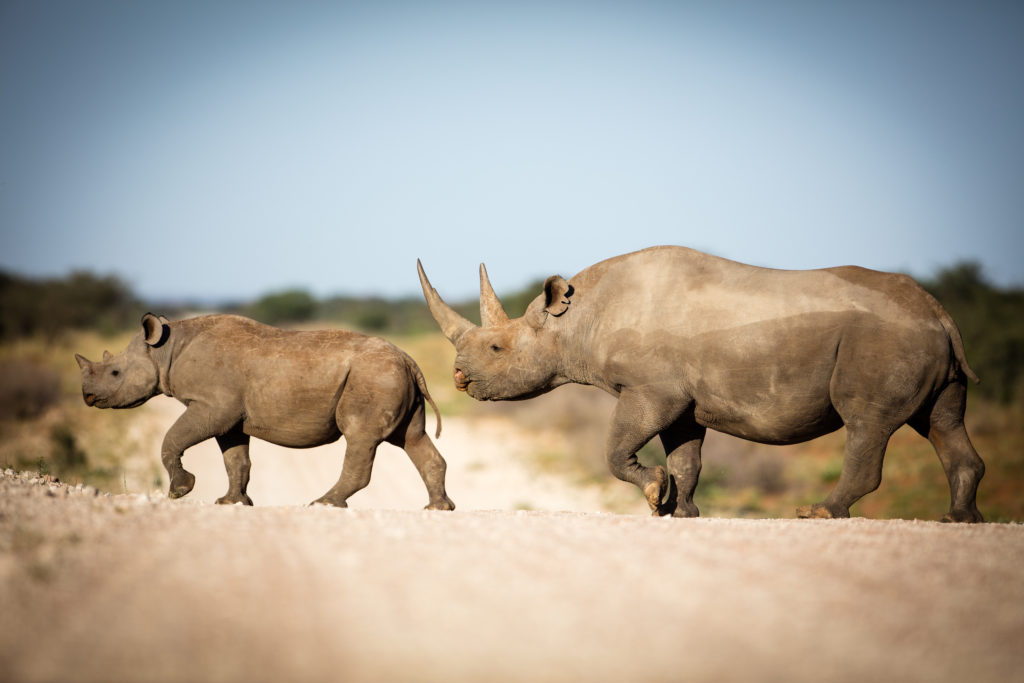
Governance.
We participated in both the Commission of Inquiry to potentially legalise the trade in rhino horn and the 2016 Rhino Lab. We are also commencing a rhino horn trade analysis project. Continuous analysis of trade trends of rhino horn is vital to ensure compliance with the legal framework. Through improved monitoring of legal domestic trade, illegal trade (both domestic and international) and historic trade in rhino horn, we will be able to ensure that key threats to rhino from trade – both current and emerging –are fully unpacked and reported, thereby facilitating informed decision making and proper accountability.
This work is made possible by US Fish and Wildlife Service, Tourvest, Hans Hoheisen Charitable Trust, Greef Properties, Relate Trust, MyPlanetRhino, Platinum Life, and Royal Canin.



